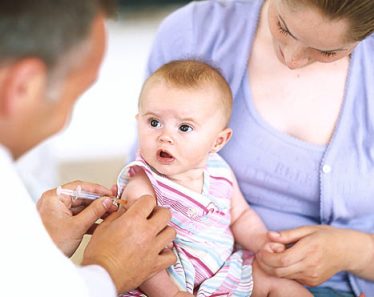By Jon Hamilton

A new study from the Centers for Disease Control and Prevention finds no link between the number of vaccinations a young child receives and the risk of developing autism spectrum disorders.
A large new government study should reassure parents who are afraid that kids are getting autism because they receive too many vaccines too early in life.
The study, by researchers at the Center for Disease Control and Prevention, found no connection between the number of vaccines a child received and his or her risk of autism spectrum disorder. It also found that even though kids are getting more vaccines these days, those vaccines contain many fewer of the substances that provoke an immune response.
The study offers a response to vaccine skeptics who have suggested that getting too many vaccines on one day or in the first two years of life may lead to autism, says Frank DeStefano, director of the Immunization Safety Office of the CDC.
To find out if that was happening, DeStefano led a team that compared the vaccine histories of about 250 children who had autism spectrum disorder with those of 750 typical kids. Specifically, the researchers looked at what scientists call antigens. An antigen is a substance in a vaccine that causes the body to produce antibodies, proteins that help fight off infections.
The team looked at medical records to see how many antigens each child received and whether that affected the risk of autism. The results, published in The Journal of Pediatrics, were unequivocal.
“The amount of antigens from vaccines received on one day of vaccination or in total during the first two years of life is not related to the development of autism spectrum disorder in children,” DeStefano says.
The finding came as no surprise to researchers who study the immune system, DeStefano says. After all, he says, kids are exposed to antigens all the time in the form of bacteria and viruses. “It’s not really clear why a few more antigens from vaccines would be something that the immune system could not handle,” he says.
The study also found that even though the number of vaccines has gone up, the number of antigens in vaccines has gone down markedly. In the late-1990s, the vaccination schedule exposed children to several thousand antigens, the study says. But by 2012, that number had fallen to 315.
That dramatic reduction occurred because vaccines have become much more precise in the way they stimulate the immune system, DeStefano says.
Hardcore vaccine skeptics are unlikely to be swayed by the new research. But many worried parents should be, says Ellen Wright Clayton, a professor at Vanderbilt University who helped write a report on vaccine safety for the Institute of Medicine.
“I certainly hope that a carefully conducted study like this will get a lot of play, and that some people will find this convincing,” Clayton says. That would let researchers pursue more important questions, she says.
“The sad part is, by focusing on the question of whether vaccines cause autism spectrum disorders, they’re missing the opportunity to look at what the real causes are,” she says. “It’s not vaccines.”
Autism Speaks, a major advocacy and research group, seems ready to move beyond the vaccine issue. Geraldine Dawson, the group’s top scientist, praised the new study and says the result should clear the way for research on other potential causes of autism.
These include factors like nutrition, which can affect a baby’s brain development in the womb, Dawson says. Other factors could include medications and infections during pregnancy, she says, or an infant’s exposure to pesticides or pollution.
“As we home in on what is causing autism, I think we are going to have fewer and fewer questions about some of these things that don’t appear to be causing autism,” Dawson says.
Professional Development Resources is featuring it’s Autism CE curriculum during the month of April to promote awareness among health professionals @ https://www.pdresources.org/searchlisting?search_input=autism&search_title=on&search_description=on













